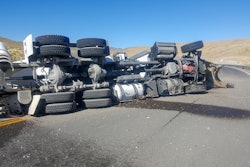Trucking news and briefs for Friday, April 5, 2024:
FMCSA extends Baltimore bridge collapse-related emergency declaration
An emergency declaration issued by Maryland Gov. Wes Moore following the container ship collision with and collapse of the Francis Scott Key Bridge in Baltimore has been extended by the Federal Motor Carrier Safety Administration.
Moore declared a state of emergency the day of the collapse, March 26. Under federal rules, declarations from state governors can only be issued for two weeks at a time, so Maryland’s declaration was set to expire on April 8.
In a notice published Thursday, FMCSA said the state of Maryland and the Maryland Motor Truck Association asked the agency to extend the emergency relief granted to truck drivers providing direct assistance to the emergency.
“Because emergency conditions, including the sudden and significant disruption of distribution operations, have not abated,” the agency is extending the declaration for a month, through May 8.
FMCSA said in the extension, direct assistance includes:
- Transportation related to the immediate restoration of essential services at the Port of Baltimore
- Transportation of commodities re-routed due to the disruptions to vessel traffic into the Port, subject to the restrictions and conditions set forth in the extension
- Transportation of fuel (gasoline, ethanol, propane, natural gas, and heating oil) from Maryland’s Curtis Bay terminal (within the Baltimore Marine Terminal area) for delivery to the following locations within Maryland: Anne Arundel, Baltimore City, Baltimore County, Carroll County, Cecil County, Frederick County, Harford County, Howard County, Queen Anne’s County, and Washington County.
The agency noted that “direct assistance does not include transportation related to long-term rehabilitation of damaged physical infrastructure or routine commercial deliveries, after the initial threat to life and property has passed, or mixed loads with a nominal quantity of qualifying emergency relief added to obtain the benefits of this emergency declaration.”
Under the terms of the extension, qualified drivers are exempt from the maximum driving time hours of service regulations in 49 Code of Federal Regulations 395.3.
[Related: Baltimore bridge collapse a 'logistical hassle,' long-term effects unlikely]
New York waives fuel haulers’ HOS regs for eclipse
The New York State Department of Transportation on April 2 issued an emergency declaration that waives the hours-of-service regulations for petroleum haulers in the state in the days surrounding the April 8 total solar eclipse.
NYSDOT said in the order that the eclipse “impacting travel across the state of New York may cause impediments to the delivery of essential petroleum products.” As such, “it has been determined that action is necessary to address this emergency and the threat it poses to public health and safety and that certain rules should be temporarily modified in order to ensure the adequate delivery of petroleum throughout the state.”
The declaration modifies the hours-of-service regulations in the New York code for the intrastate transportation of fuels performed by carriers between points throughout the state. The waiver is effective April 6 through April 10. HOS modifications under the order include:
- The 70-hour maximum on duty period in 8-days is modified to be 84 hours.
- The 60-hour maximum on duty period in 7-days is modified to be 74 hours.
- The 14-hour maximum workday is modified to be 16 hours. An 8 hour off duty period must be taken to reset the 16-hour provision.
- The 34-hour restart provision is modified to be 24 hours. Carriers can utilize a 24-hour off duty period that occurred prior to the date of the declaration.
- On-duty time for the purposes of computation of the 60/70- or 14-hour rules shall not include time spent waiting in a commercial motor vehicle while on the property of a shipper or carrier, loading point, unloading point, or terminal immediately subsequent to or preceding loading/unloading operations.
The full text of the waiver can be found here.
Fleet safety training program expanded to TANY members
The Trucking Association of New York (TANY) is partnering with Together for Safer Roads (TSR) to extend the FOCUS on Fleet Safety Training Program to TANY members, specifically small- to mid-size fleet operators and drivers.
The collaboration builds on the success of the program in fostering safe and efficient fleet operations and represents a significant step towards enhancing safety cultures and achieving Vision Zero goals, the groups said.
The FOCUS on Fleet Safety Training Program, TSR’s signature workforce development safety program, helps independent fleet operators develop their safety culture with expertise and best practices drawn from TSR’s diverse group of leading fleets and technology companies. The comprehensive FOCUS program is structured around three key pillars: training and development, safety leadership, and technology. It includes executive coaching and before and after benchmarking.
The groups said the program is specifically designed for independent, small and mid-sized haulers, acknowledging the unique characteristics of those operations. Recognizing the time and resource constraints faced by those fleets, the program goes beyond mere compliance, offering practical insights and expertise to establish premier fleet safety programs.
"Small–to-mid-size fleets account for roughly 97% on the road," said Peter Goldwasser, Executive Director of TSR. "We are proud to partner with the Trucking Association of New York on this expansion of the FOCUS on Fleet Safety Training Program, reaffirming our commitment to saving lives and creating safer roads in New York State, while gaining valuable insights that can help continue to expand this program to fleets across the country."












